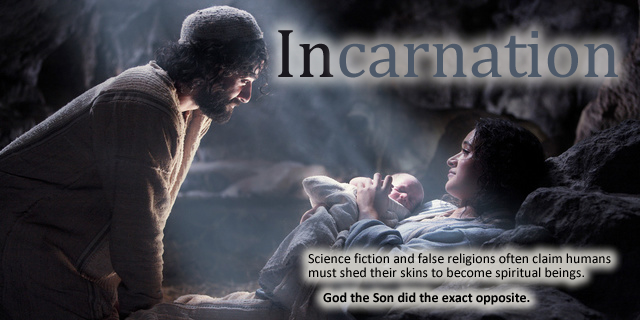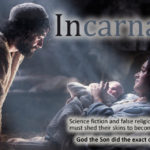Incarnation, Part 3: Conception
“Best books of 2012” lists, like this and this, have come to popular Christian websites. They bug me. They include only books of doctrine, history, biography, Very Practical Resources for ministry — which overlook a crucial Resource that God Himself endorsed in His Word:
 Imagination. Story. Creativity. Not ignoring truth, but accepting truth as revealed by God, then running it through a “simulation.” Asking of it, “what if?” Setting the Word to music.
Imagination. Story. Creativity. Not ignoring truth, but accepting truth as revealed by God, then running it through a “simulation.” Asking of it, “what if?” Setting the Word to music.
If ministers ignore the music of imagination, they risk teaching half-truths. In fact, I have even begun saying — I hope not in a legalistic way — that not even giving fiction honorable mentions in best-books-of-the-year lists, rejecting fiction by default, is inhuman.
There’s a reason God’s Word doesn’t only offer a series of systematized theological truths.
And there’s a reason Christ didn’t “count equality with God a thing to be grasped” (Phil. 2:6) and instead chose to undertake a drastic divine experiment with success guaranteed: to be clothed in flesh. He extended Himself, not losing any of His divinity, but adding humanity.
At Christmas and any other time, I suggest we can appreciate this truth more even in our limited efforts to explore this — exploring not only with true, propositional statements:
The Son of God, the second person of the Trinity, being very and eternal God, of one substance and equal with the Father, did, when the fullness of time was come, take upon Him man’s nature, with all the essential properties, and common infirmities thereof, yet without sin; being conceived by the power of the Holy Ghost, in the womb of the virgin Mary, of her substance. So that two whole, perfect, and distinct natures, the Godhead and the manhood, were inseparably joined together in one person, without conversion, composition, or confusion. Which person is very God, and very man, yet one Christ, the only Mediator between God and man.
— from the Westminster Confession of Faith, chapter VIII
 … But also with Biblically informed imaginations. We accept God’s Word, then ask, what if?
… But also with Biblically informed imaginations. We accept God’s Word, then ask, what if?
- To the extent that God is “conscious,” fully aware, omni-everything and always consistent with His perfect, standard-setting loving and holy nature — how did Jesus experience the incarnation? Dwelling in eternity, did He sense an existence-shattering perception shift as He, the “timeless One, stepped into time”?
- Imagine the moment the Holy Spirit’s power came upon Mary (Luke 1:35). What did this look like at the molecular level? Were there “special effects”? Invisible light within? What exactly intersected with Mary’s egg and genetic code?
- How did the joining begin to grow? Did Mary have any health complications, or was this a pregnancy with no glitches?
- Surely because Christ was fully Man, He developed in utero as a completely normal human baby. Did that mean He had no divine-level consciousness at that point?
- Did the unborn Christ respond to outside activity, as did John (Luke 1: 39-45)?
- Is it all right to realize, carefully, that Christ as a newborn infant — as well as during His whole earthly life — was a real, physical, normal-looking baby? He would have emerged with bodily fluids, slimy and red and squalling. Joseph, or whoever helped with the delivery, would have needed to cut the umbilical cord.
-
“… But little Lord Jesus, no crying He makes,” goes the second verse of “Away In A Manger.” Scripture doesn’t say that He did cry, but like a normal human, He must have. If so, did His earthly parents expected otherwise? Were they surprised?
- Later, Mary and Joseph took turns changing His diapers. Jesus had accidents. How can we honor His humanity about this without forgetting His equal divinity?
- When and how did Jesus “wake up” and realize He was God and had a mission? Or did He always know? How might His earthly parents have communicated this to Him? Or did they also assume along with Him what He had come to do?
- What was it like to have a truly perfect Son? Or (perhaps worse) a perfect Brother?
- Why don’t we more often use this argument in apologetics: that unlike other faith founders, all of Jesus’s known family, including His brothers, believed in Him?
- How did His omniscience and omnipotence “fit”? The human body and mind can only encompass so much. Surely omni-everything attributes do not count. Is this why Christ often referenced His close relationship with the Father? Did He have a “connection” and this is what “kept” Him fully God, in terms of His powers, not His divinity? (His divinity was never “turned off”; I believe that’s one of the heresies.)
- Do we often consider: Jesus was the only true, real superhero Who ever lived?
- How might we honor His incarnation in the fantastic fiction we love, or write?









































Babies have consciousness inside the womb. I’ve read studies where they watched the baby on ultrasound as a lady read books to them. She got them used to being read to, and when she’d start reading, the baby would smile. They’ve also tried playing music to unborn babies, and the babies know when a note sounds off. They even cry in the cadence of their mother tongue.
http://www.usnews.com/science/articles/2009/11/05/newborn-babies-may-cry-in-their-mother-tongues
There’s a short little verse somewhere about how “the boy grew in stature and favor with God and man”. So I think Jesus knew exactly who he was from birth, and acted accordingly. We know the story of how he taught in the temple when he was 12.
There’s a joke in one of the Sabrina movies about the title hero, who is a total jerk. “What was he like when he was a child?” “Shorter.”
Thinking back, I can’t remember a time when I didn’t know I was me. My earliest memories, I knew who I was. Jesus would be the same way, only more so, because he’s God.
I definitely agree — I was thinking more like “adult consciousness,” for a familiar comparison. Either way, in some sense He may have “lost consciousness,” becoming an infant child like that. If I had been writing the Story, I would have the Hero incarnate as an adult to bypass that conundrum. God is the infinitely more daring Author (though of course He perfectly knows and plots the outcome).
Somehow I also suspect it must have been like that for Him. Still, though, imagine those moments in which His parents recalled His true heritage. Something He did. Something He said. A kind gesture. A perfect discernment of someone’s suffering.
Good stuff, Stephen. A smorgasbord for thought.
Regarding the “…no crying he makes…” in Martin Luther’s song, I believe he wrote that because at one time, it was considered sinful for a baby to cry. Seems silly, but that’s what they used to think. So if Luther held to that theory, he’d have assumed that the infant Jesus didn’t cry, since He was without sin.
I take that as reminder to be cautious about what we base our beliefs upon. Some things that are “common knowledge” may be untrue. The only things we can be certain of are those the scriptures make clear.
I agree with Kessie: I expect Jesus was always aware of Who He was, to one degree or another. But did His developing physical brain take some time to fully comprehend it all? We can’t know. Kinda goes along with the question concerning how He experienced the incarnation. That sort of thing makes me dizzy to contemplate. I’m thankful there won’t be a test on it.
If I recall right, Luther didn’t actually write that song — his name became attached to it because it was in a Luthern book of children’s poems.
Normally I’m sensitive to Gnostic-type notions, but in this case I think it’s innocent. If someone has a very Spiritual view of what the birth of Christ was really like, without howling and fluids and smelly animal stalls and such, it’s likely not due to that line!
You’re right. I don’t know who wrote that one, but it definitely wasn’t Martin Luther.
How can we begin to speculate how God experiences anything? We can only experience one thing at a time. Our perception is bound to time. I think we have to assume that God experience all things that happen at all times “at the same time,” but of course no being apart from God could begin to imagine what that infinite consciousness is like.
I forget the reference, but I believe in one of C.S. Lewis’s books, Lewis wrote that God always has had the experience of being human, from the foundation of the world, “before” Jesus was born in our linear time. Imagine this –not only did God become human, but eternity intersected with finite time!
Bainespal, I was just thinking about this recently! Because God is outside of time, I wondered, can He look over all of time at once, kind of like an author can jump around between the pages of their book if they want, and see it all spread out before them? It’s neat to contemplate, although we as finite humans cannot really know how an infinite God experiences things!
These are all such fascinating thoughts and the kind of things I enjoy pondering, especially now that I am a mother myself. The story of Mary and Joseph is so much more powerful to me, having given birth to my own children.
I love thinking about how Christ was the only true “Superhero” who ever lived! In a way, being a geek fuels my awe for God, because the things the rest of the world thinks are “geeky” and imaginary (superheroes, supernatural things, etc.) are TRUE and REAL to me, and so much more amazing than the stuff of comic books or fiction.
GOD becoming MAN. An infinite, eternal Being entering into the time and space that He created. An Author becoming the human Hero of His own story… This stuff is greater than any fiction. 🙂
I remember reading once that Prince Charles said that he ‘didn’t suddenly sit up in his pram one day and think ‘I’m going to be king” but that it was just something that grew gradually.
I assume Jesus always knew he was God, but only with the level of perception that a child of that age could have of the concept. (But, of course, a perfect child)
So before he learned to speak/understand Aramaic he would knot know it in words – but just with the same kind of perception that a baby understands who he is. Of course, we don’t really understand fully what babies can understand anyway!
As a 3 or 5 year old, he would understand on a 3 or 5 year old’s level. But a perfect 3 or 5 year old’s conception of God, not ours.
Perhaps, therefore, it wasn’t until he was 12, the kind of age we really do start thinking ‘who am I?’ that it really crystalised for him as something he knew intellectually rather than just something he knew instinctively.
If that makes any sense.
I’d think it would be like a video game. The “God” aspect would be like how we as human beings exist in the real world, and can see and perceive reality by multiple means. We have omniscience in games because we can rely on everyone who has already beaten it to write faqs detailing everything that happens in the game and even in prequels and sequels. We have miraculous powers in the sense that we can hack into the physical structure of the game and alter the parameters through cheat codes and manipulating the game’s programming if we are hardcore enough. We even can create, destroy, or copy worlds.
But in the same sense we are also fully a character in the world. We follow the normal mode of characters in the game in that we have to react to it in limited ways (fight/item/escape?) The character has their own identity, history, family, and place in the world. I am D.M. Dutcher, but I am also Master Chief, or Cloud Strife. When I talk to Aeris, I talk in dialogue bubbles. Not a human voice, or not my own if the game is voiced. And we even suffer the same kind of indignities of such: going to the bathroom versus a 1% rare item drop rate. I’m sure video game characters wouldn’t be all that keen on grinding endless battles for vanity loot if they could speak. We incarnate in the game world as a character, yet also remain ourselves.
It’s much more confusing than this, and I can’t conceive of a reality beyond life where what I do is as limited as a video game character is to me. Plus, game characters aren’t self-aware, nor have freedom and free will. Honestly all I really can say is that it’s a mystery. But maybe the analogy will be helpful. Or at least non-heretical: saying things about the nature of the Incarnation is tough even for theologians.